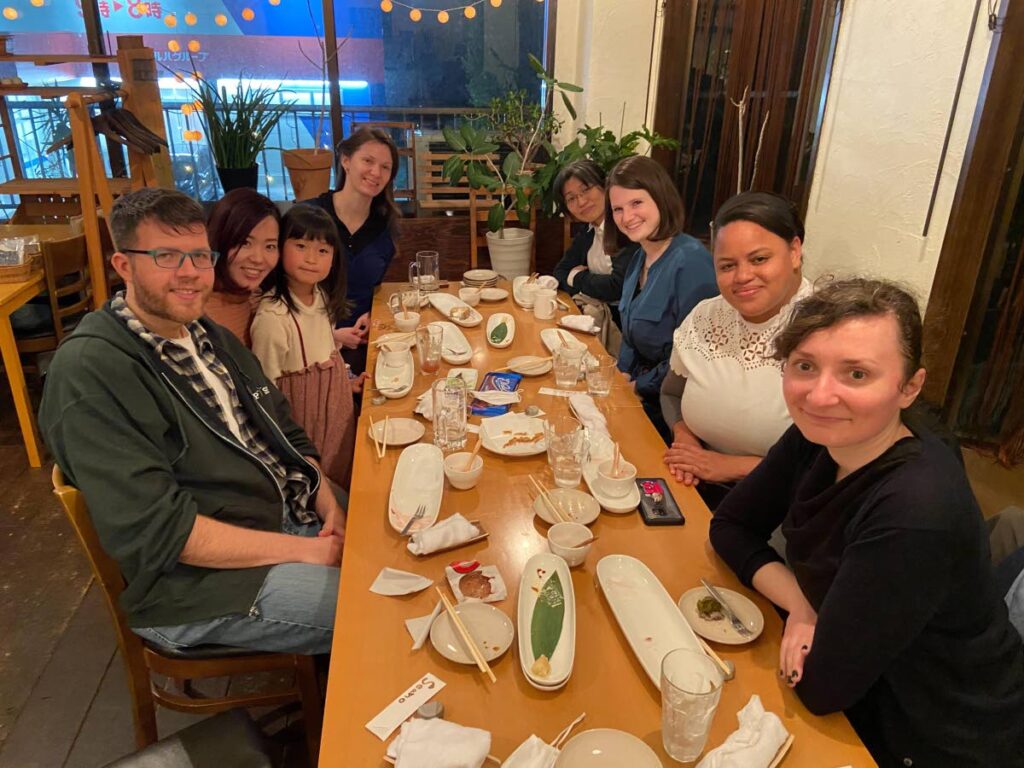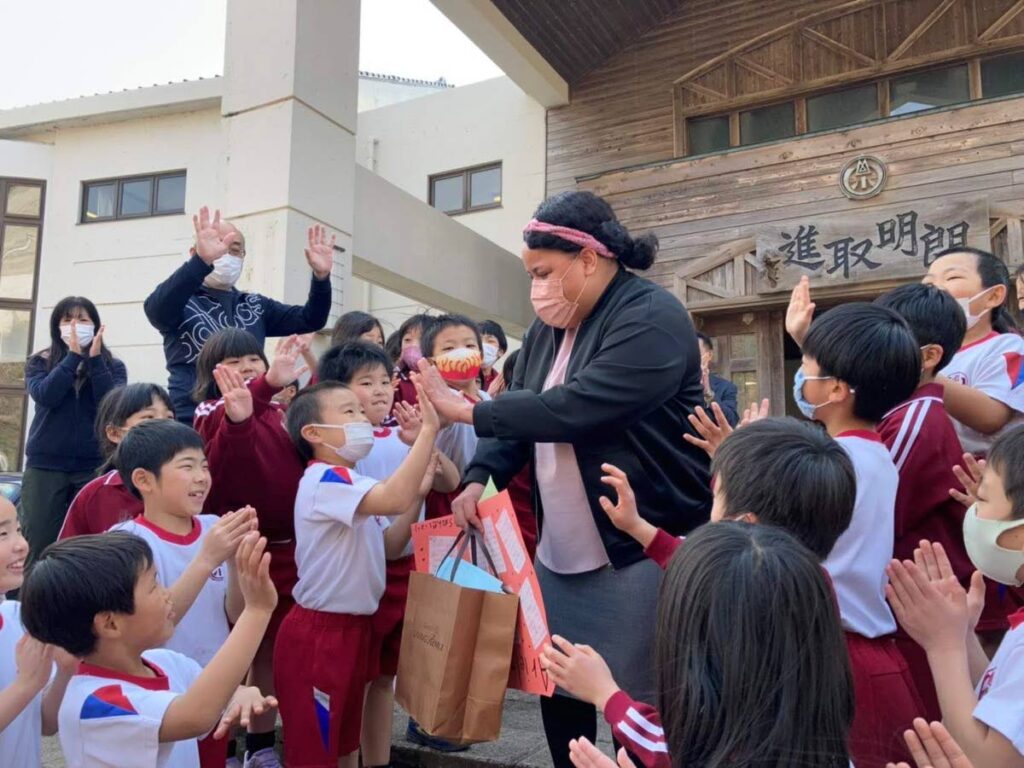Features
Rhianna McKenzie

The Oki Islands archipelago, located in the Sea of Japan, is known for its abundance of fresh seafood and pristine coastal scenery. Consisting of a collective of 180 islands, the terrain is quite similar to that of Trinidad and Tobago. Both countries, however, still have their distinct differences, and the people there had plenty to learn about TT with the help of English teacher Ariel Matthews.
Matthews, 28, moved to the Oki Islands (also called Okinoshima) through the Japan Teaching and Exchange Program (JET). She spoke candidly with Newsday about her time on Dogo – the island where she settled and spent nearly four years – and how she was able to bring a taste of her Trini culture to the remote island.
Matthews said the Oki, like the TT, is a melting pot of the influences of many travelers who have passed through.
“While learning about Oki from a friend, they explained to me how its culture is very different from most other places in Japan,” she said. “It has such a rich culture, mainly because of all the other people who have passed through the island or been lucky enough to settle here. Similar to TT, the variety (in Okinoshima) is a result of our very vibrant history.”

She said the islands were once designated as a remote exile area. Over the years, emperors, nobles and government officials were sent there as punishment.
“Of course, this is not the place I found when I stepped off the ferry on August 8, 2018 and met the smiling faces of my new colleagues and friends who had come to greet me at the port.”
She said the islands are now well connected with an airport and several ferries that run daily. There are local supermarkets with an abundance of fresh seafood.”
She described her first months on the island as a challenge, but quickly grew to love her new city.
“I went through all the stages of culture shock in my first two months here. The honeymoon phase saw me running around Tokyo and other big cities with my friends. I was amazed at how clean everything was, how considerate of each other everyone was (and) how accessible the transportation was. I was having the time of my life.”
She said, however, after a while the reality of being miles away from home set in. I realized that on this small island of about 14 thousand inhabitants, I was the only one who looked like me”.
Matthews said people often stared at her when she left her apartment to run errands, and she became paranoid about leaving her home, feeling she was always being watched.
“My Japanese level was also very low and I quickly got tired of always trying to understand and be understood. I refused to listen to anything Japanese in my house and, to calm my anxiety, I looked for more English speakers from other prefectures to connect with.
“It only lasted a few months thankfully. Soon after, the sightings became less frequent (or I didn’t notice) and I made Japanese friends and improved my language skills and felt comfortable being away from my family.

“Up until a year ago, I was very comfortable and felt like a contributing member of my community.”
She said, however, there was still a lot about TT that she missed. “Getting my favorite Trini foods still took a bit of a struggle. For example, I had to order things like lentil peas, channa, salt and cornmeal from Amazon since I couldn’t get them on the island.
She said that during the pandemic, when everyone was doubling up during the lockdown, she had to order tamarind from a website to do the same.
“If I wanted to eat anything that remotely resembled the food we have at home in a restaurant, I had to take a ferry from the island to one of the ports on the mainland and eat then spend the night in a guesthouse and come back home on the morning ferry.”
Combining education and cultural exchange
Matthews said she had an early interest in the JET program as she thought it was a good opportunity for someone like her who was passionate about her country, education and cultural exchange.
After completing her Bachelor of Education studies with a specialization in English language and literature at UTT, she applied for this program. “It was the opportunity and the interest. JET makes the goal of teaching internationally accessible. To add to this, Japan’s education system is world famous.
“There are many things about the Japanese education system that I admire and truly believe would be beneficial to our schools here in TT.”
As a JET participant, Matthews taught in several schools as an assistant language teacher, but an important part of her role as a participant was to be an ambassador for her country and teach her students about Trinbagonian culture.
“I’m very proud of everything I’ve done to teach about TT here. I have given presentations to thousands of students and teachers about our food, history and culture.

“We’ve been able to do it all, from a carnival mask-making event at the local cultural center to cooking Trini food at the summer camp organized for high school kids from all four islands.
“On one special day last December, students from all 13 schools ate TT lunch carefully prepared by the school lunch centre. Posters were distributed throughout the school.”
She said that when she first arrived, few people had heard of TT and no one could pronounce the name, but by the time she had left, most people were familiar with some form of TT culture.
Matthews has taught thousands of students and worked closely with nearly 100 teachers in 11 schools.
“By the end of my time at Oki, I was able to build strong bonds with my students that made it so difficult to leave. I really enjoyed learning and teaching Oki’s children.
A tearful goodbye
Matthews left the Oki Islands in March and is now an international school teacher in Tokyo, where she plans to stay for at least another year.
Before she left, however, her colleagues, students and friends at Oki Island spent the last few weeks celebrating.
“The translation I received was nothing I could have ever imagined. There were many ceremonies and celebrations. I met with Okinoshima City Mayor Kōsei Ikeda and Education Superintendent Kōichi Notsu. I gave a speech about my time at Oki and thanked them for all their support.
“On my last day of work, flags were made with the TT flag on one side and the Oki Islands flag on the other. Workers from all three floors of city hall stood on both sides of the hallway and I was handed two bouquets of flowers as I walked out.
“The people I’ve worked with, helped me, and whose children I’ve taught waved at me as I left the building. After that, I was driven home in the car that belonged to the head of the island’s education department. . never felt more special in my life.”

She said a few days later, she left the island on the evening ferry, but not without another tearful goodbye.
“Many people came to the harbor bringing gifts. I had already sent a suitcase full of gifts to my new home and (recently) received another suitcase of gifts. People came to congratulate me and express their thanks for what I have done in Oki.”
She said for an hour before the boat arrived, she was hugged and serenaded by well-wishers in the community with ribbons tied from the boat to people on the dock.
“I was surprised when I looked up from the ferry and saw three of my colleagues and my bosses playing musical instruments and singing, ‘Joy! Now you appear on the big, big stage of your life. You are about to go a long way. We wish you a happy day. May you have wonderful and happy days.’
“As the ferry pulled away from the shore, the ribbons burst and we kept waving at each other until we were out of sight of each other. I will never forget that day and I will never forget Oki.”
Matthews says she’s not sure what her future holds, but her ultimate goal is to learn more about different education systems in hopes of one day using that knowledge to positively impact and support the education system of TTs.
“I want to continue learning, then go back home and support the Ministry of Education.”


